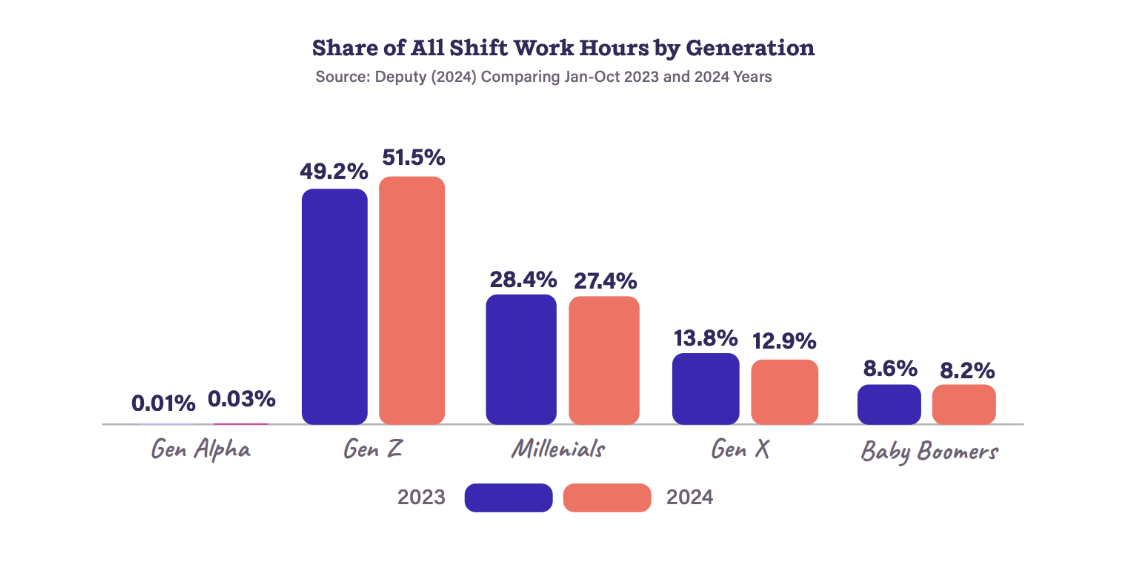Gen Alpha is next, and they already have opinions about the way they work
While still years away from joining the workforce, Gen Alpha (those born in 2013 and onward) is watching how we work — and taking notes.
In fact, many Gen Alphas are growing up in households where gig work, multi-job hustles, and self-scheduling are the norm.
Gen Alpha is on track to surpass Gen Z in the shift work economy by 2038.
Meanwhile, Gen Alpha will enter the workforce expecting digital fluency and autonomy, especially given the integration of AI into business operations (like workforce management).
Businesses that want to future-proof their hiring strategies should begin thinking now about how to support younger workers who will come in with radically different expectations than previous generations.

| Key takeaway: What Gen Z started, Gen Alpha will continue. Employers that evolve now will be in the best position to welcome the next generation of workers. |
|---|
The trend of poly-employment is the new normal for many hourly workers
Forget the traditional 9-5 job — many hourly and shift workers today are now juggling multiple jobs, income streams, or side gigs. And it’s not just to stay afloat; they’re looking to build more autonomy into their lives.
Deputy found that poly-employment surged to 5.4% in 2024, due to factors like inflation
68% of poly-workers are Gen Z, followed by 25% Millennial
Hospitality remains the most common poly-employment sector, with 42% of poly-workers holding jobs in the hospitality sector
Source: Deputy’s Big Shift 2025 Report
Of course, other factors play into poly-employment, too. For example, the desire for flexibility, and in some cases, a pursuit of passion projects alongside paying work, have further driven the shift to poly-employment. Today’s workers often have more than one boss — and that changes how you schedule.
| Key takeaway: To stay competitive, businesses must design shift schedules that are predictable, flexible, and compatible with a poly-employed workforce. |
|---|
Gender representation in shift work is evolving, too
The composition of the shift workforce is changing — and with it, a stronger push for gender equity, inclusivity, and fair treatment at every level.
58% of poly-workers are women, which indicates that younger women are being disproportionately impacted by factors like cost of living — Deputy
Further, our data shows that:
Women are more heavily represented in healthcare and hospitality (female shift workers increased from 57% to 59%)
Across all industries, women are making up the majority of shift workers (according to Deputy’s platform, women account for 82% of all shift work hours recorded)
Source: Deputy’s Big Shift 2025 Report
With this shift in gender representation, it’s more imperative than ever that employees have access to inclusive and equitable opportunities for training, advancement, fair wages, and participation.
| Remember: To build trust with workers, employers must back up inclusive values with clear policies, equitable scheduling, and a workplace culture that supports all identities. |
|---|
2025 brings a workforce in transition
The shift workforce of 2025 is younger, more digital, and more vocal than ever before — and that’s a powerful shift for businesses willing to evolve.
There are 4 key things to consider when hiring and optimizing your workforce this year:
Gen Z and Gen Alpha are prioritizing both workplace culture and pay — and they’re not willing to compromise on either.
Poly-employment is becoming the new normal.
Women are increasingly taking on more shift work.
Employers who embrace these changes through flexible scheduling, inclusive policies, and smart workforce tools will gain a competitive edge in attracting and retaining top talent.
Explore more big shifts that’ll impact your business in 2025
Deputy’s Big Shift Report dives deeper into the data behind the core trends and changes that’ll impact your business in 2025. Download the full Report for all of the insights and research from the Deputy team, today.

